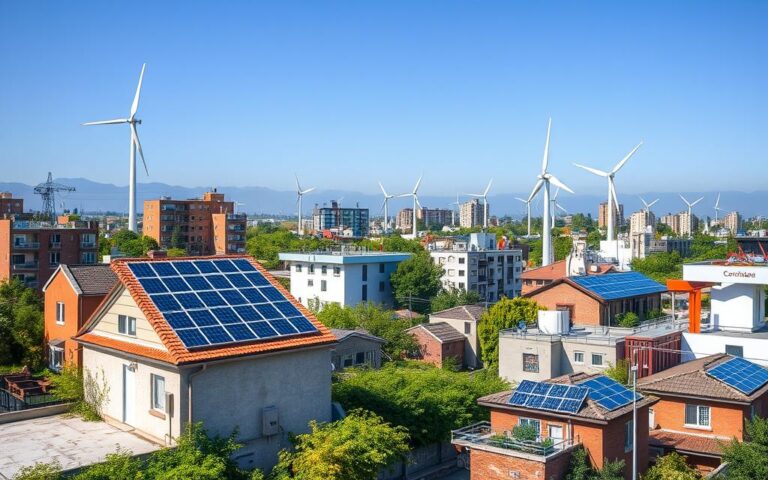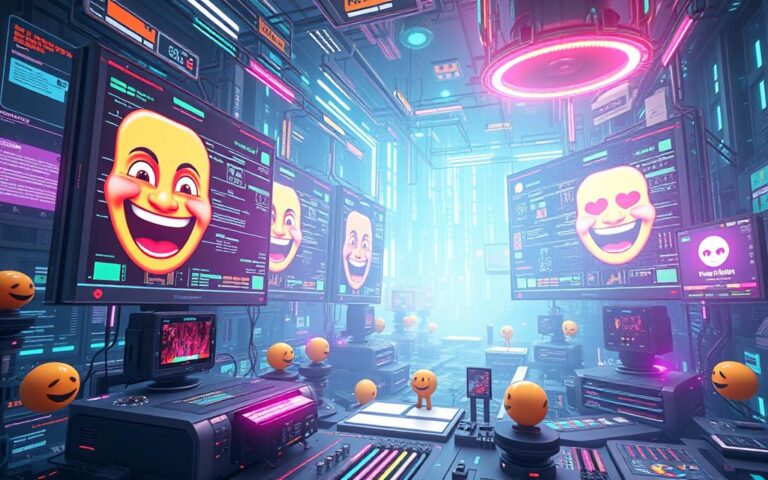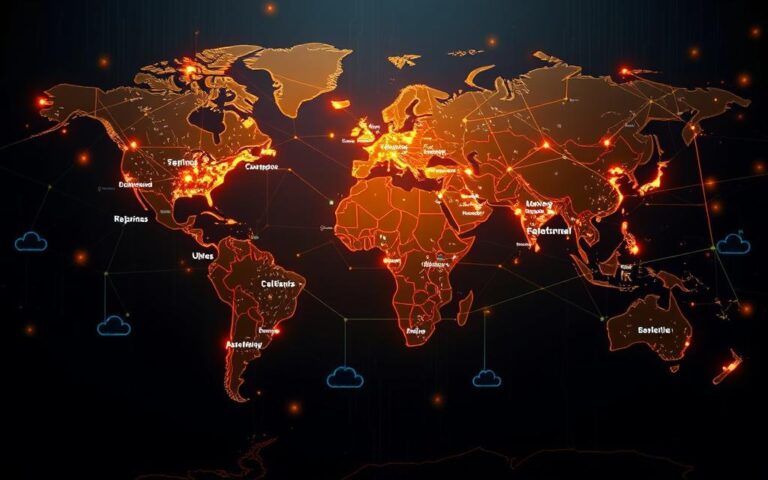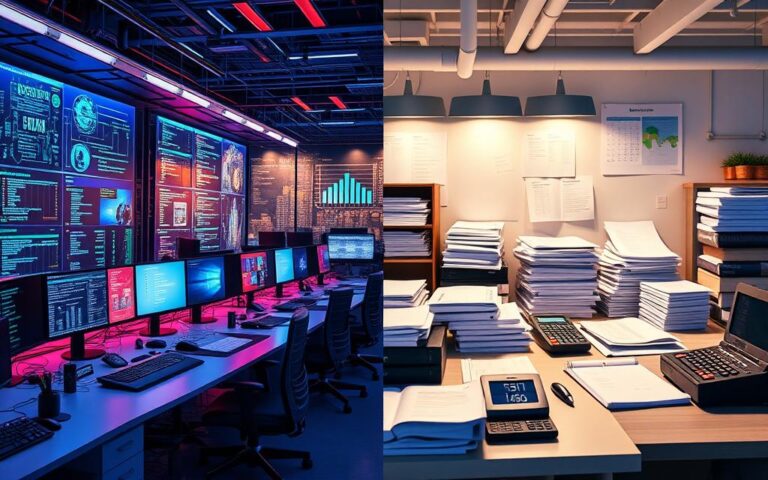Imagine a World Without Technology: Challenges and Realities
Thinking about a world without technology is complex. It raises big questions about living without it. A world without tech would face big economic problems. The tech industry employs millions, and losing it would cause huge job losses.
Also, we would lose a lot of information and knowledge online. This could slow down progress in many areas. It shows how hard it would be to live without technology in our daily lives.
Living without technology would change our lives a lot. It would affect how we talk to each other and find information. It would also change how we deal with our environment.
The medical field, for example, uses a lot of technology. Going back to old ways could make healthcare harder. But, a world without tech might also be better for the planet. It could use less energy, produce less waste, and reduce carbon emissions.
Understanding What a Technology-Free World Really Means
To understand a world without technology, we must first define what technology is today. The technology definition includes many tools and innovations that change how we live and work. Things like artificial intelligence, the internet of things, and social media are now part of our daily lives.
Technology has made it easier for us to get information, talk to others, and do many tasks. But, it’s important to know the difference between basic tools and modern innovations. Modern innovation makes tasks more efficient but also worries about losing jobs and feeling isolated.
- Limited access to information and communication
- Reduced efficiency and productivity
- Increased social interaction and community engagement
In conclusion, knowing what technology is and its effects is key to understanding a world without it. By looking at how technology has advanced and its impact, we can see its good and bad sides. This helps us make smart choices about using technology in our lives.
Historical Perspective: Life Before Modern Technology
Looking back, life before technology was very different from today. Humans used early stone tools in the Paleolithic era and more advanced tools in the Neolithic period. This shows how technology has grown from simple tools to complex machines.
Before technology, people relied on manual labor and traditional crafts. They made pottery, wove, and blacksmithed without modern tools. This shows how important human creativity and ingenuity were in developing technology.

- The development of stone tools during the Paleolithic era, around 70,000 BCE
- The emergence of metal age peoples around 3,000 BCE, marking a significant shift in technological advancements
- The Neolithic Revolution, which saw a significant increase in technological innovation and complexity in human social and political organizations around 3,000 BCE
These milestones show how technology has grown over time. It moved from simple tools to complex systems and machines.
In conclusion, looking at life before technology helps us understand human innovation and traditional crafts. It shows how technology has changed over time and its impact on our lives today.
| Time Period | Technological Advancements |
|---|---|
| Paleolithic Era (70,000 BCE) | Development of stone tools |
| Neolithic Period (3,000 BCE) | Emergence of metal age peoples, Neolithic Revolution |
| Modern Era (20th century) | Significant acceleration of technological development |
How Would the World Be Without Technology Today
Imagine waking up in a world without technology. People would have to talk face-to-face or write letters. This would make communication very hard, especially in today’s digital world. About 60% of people without tech face big communication problems.
Traveling long distances would be tough without cars, planes, and other modern transport. Healthcare would also suffer, with no modern medical tools or info. The economy would collapse, affecting global trade and commerce. A study on technology’s impact shows finding a balance is key.
Living without tech has its benefits. It could make people more mindful and mentally well by 30%. It could also cut down on electronic waste by up to 40% per person. But, the challenges are big, and we must think about a world without tech. Here are some important stats:
| Category | Statistic |
|---|---|
| Technological Minimalists | 20% of the population in developed countries |
| Off-the-Grid Communities | 15% increase over the past decade |
| Indigenous Tribes | 80% have maintained their traditional lifestyle |
The Social Impact of Removing Technology
Removing technology would deeply affect our lives. We’d have to talk face-to-face and use old ways to communicate. This could make our communities closer and more connected. But, it might also cause people to feel isolated and lose touch with others.
Some possible effects of technology removal include:
- Less stress and loneliness from being always connected
- More exercise and less screen time
- Better sleep from fewer notifications
- More time for hobbies and productive activities
Today, 4.66 billion people use the internet globally, and IT jobs grew by 391,000 positions. Removing technology would be a big change, making society go back by at least 50 years. 
Stepping away from tech lets us enjoy moments with family and friends more. It helps us find a better life balance. By setting goals to disconnect and having “do not disturb” times, we can feel better and lessen the social impact of tech.
Education and Knowledge Sharing Without Digital Tools
Learning without technology would change how we get and share information. Traditional ways like apprenticeships and mentorship would grow. Reading books would be a key way to learn, as it’s one of the few sources left.
This method has its good points. It helps us understand things better and think critically.
Without technology, we’d have to rethink how we learn. Hands-on training and practical skills would be key. We’d need new ways to share knowledge, like libraries and community centers.
- Less access to info and resources
- Fewer chances to work together and talk
- More focus on old teaching methods
But, old ways of learning have their benefits. They encourage real-life interaction, hands-on learning, and a more personal education. As we think about learning without tech, we must consider both sides. We need to find ways to make traditional learning work for today’s students.
Environmental Implications of a Tech-Free World
The idea of a tech-free world has big environmental effects. It could mean less energy use and fewer greenhouse gases. But, it might also mean less access to environmental info and resources.
Some main environmental effects of a tech-free world are:
- Less e-waste, as we’d use fewer electronics
- Less energy needed, since devices and data centers wouldn’t be used
- More pollution, as new ways to make and move things might not be as clean
Living without tech would change our lives a lot. We’d have to find new ways to talk, work, and get info. It would also mean changing what we value, focusing more on environmental sustainability and community.

In summary, the effects of a tech-free world are both good and bad. It could cut down on energy use and e-waste. But, it might also lead to more pollution and less info access.
Business and Commerce Without Modern Technology
In a world without modern tech, businesses would use manual trading systems. This would make the economy more personal and local. It would also change how people work, as companies would have to find new ways to operate.
A report by Godwin Ehichoya shows how tech has changed business. It lets companies reach more people than ever before.
Return to Manual Trading Systems
With manual systems, businesses would focus on local markets. They would need to build strong ties with customers and suppliers. This could make the economy more sustainable and community-focused.
But, it would also make it hard for businesses to compete globally. As Calling All Freaks points out, our world is now all about tech and digital changes.
Employment and Labour Changes
Switching to manual systems would mean big changes for work. Companies would have to train employees in new skills. Skills like communication and negotiation would be key.
This could make workers more skilled and flexible. But, it would also cost a lot to train them.
| Aspect | Impact of Business without Technology |
|---|---|
| Employment | Increased focus on local markets and community-driven economy |
| Labour | Need for employees to develop new skills, such as communication and negotiation |
| Global Trade | Limited access to global markets and resources, making it challenging for businesses to compete on a larger scale |
Essential Services in an Analog World
In an analog world, many services would face big challenges. Healthcare, education, and transport are just a few areas hit hard. Hospitals would struggle without modern tech, leading to lower care quality.
Education would suffer too, with no digital tools or online learning. This could mean worse education and less access to knowledge. Transport would also be hit hard, with no cars or planes.
Some big challenges for essential services in an analog world include:
- Lack of access to medical equipment and information
- Limited access to educational resources and information
- Reduced transportation options
Yet, people are drawn to analog experiences like vinyl records and books. This shows a desire for something more real and personal. This could help essential services in an analog world.
In conclusion, essential services in an analog world need big changes. We must understand the challenges and chances of such a world. This way, we can build a fair and sustainable system for these services.
| Essential Service | Impact in an Analog World |
|---|---|
| Healthcare | Lack of access to medical equipment and information |
| Education | Limited access to educational resources and information |
| Transportation | Reduced transportation options |
Conclusion: Reflecting on Technology’s Role in Modern Society
The role of technology in modern society is deep and wide-ranging. It has brought many good things, like better communication and more access to information. But, it also brings big challenges that we must deal with.
Businesses have seen a lot of progress, making customer experiences better with data. Yet, they also face dangers like data breaches and less face-to-face time.
Having information at our fingertips has changed education and sharing knowledge. But, we worry about privacy, cyberbullying, and getting too caught up in digital stuff. Also, technology’s harm to the environment, like deforestation and pollution from old electronics, is a big issue.
Looking at technology’s role, we see it’s key to find a balance. This balance is important for a future that’s both sustainable and fair for everyone.
FAQ
How would people communicate, access information, and navigate their daily lives in a world without smartphones, computers, and the internet?
The first source says our lives have changed a lot with technology. It makes things faster and more comfortable. But, we’ve also become less active and less social in person.
What is the definition of technology in the modern context?
The second source explains that technology is everywhere in our lives. 96% of people in the US use it every day. It ranges from simple tools to advanced things like artificial intelligence and the internet of things.
How did life differ before modern technology compared to today?
The third source notes that life without today’s tech is hard to imagine. Yet, people found ways to communicate and create goods without it. They used messengers and postal services, and practiced traditional crafts.
How would the impact of a technology-free world affect daily life?
The first source says life without tech would be very different. People would have to use old ways to communicate, travel, and work. This would bring big challenges to our daily routines.
What would be the social impact of removing technology from our lives?
The second source says tech affects all parts of our lives. Without it, we’d have to talk face-to-face more. This could make communities closer but also lead to isolation and broken social bonds.
How would education and knowledge sharing be affected in a technology-free world?
The third source suggests people would read books for knowledge. Traditional learning methods like apprenticeships would become more common. But, getting information would be much harder without digital resources.
What would be the environmental implications of a technology-free world?
The first source notes that tech has changed how we interact globally. But, it also causes environmental problems like e-waste and pollution. A world without tech might use less energy and pollute less, but we’d lose access to environmental info.
How would business and commerce operate without modern technology?
The second source says our world is all about tech and digital migration. Without it, businesses would have to go back to manual systems. This could make economies more personal but also limit access to global markets and jobs.
How would essential services function in an analog world?
The third source says things like hospitals and airlines would have to close. Healthcare and education would suffer without modern tools and info. Transport would also be a big problem without cars and planes.









